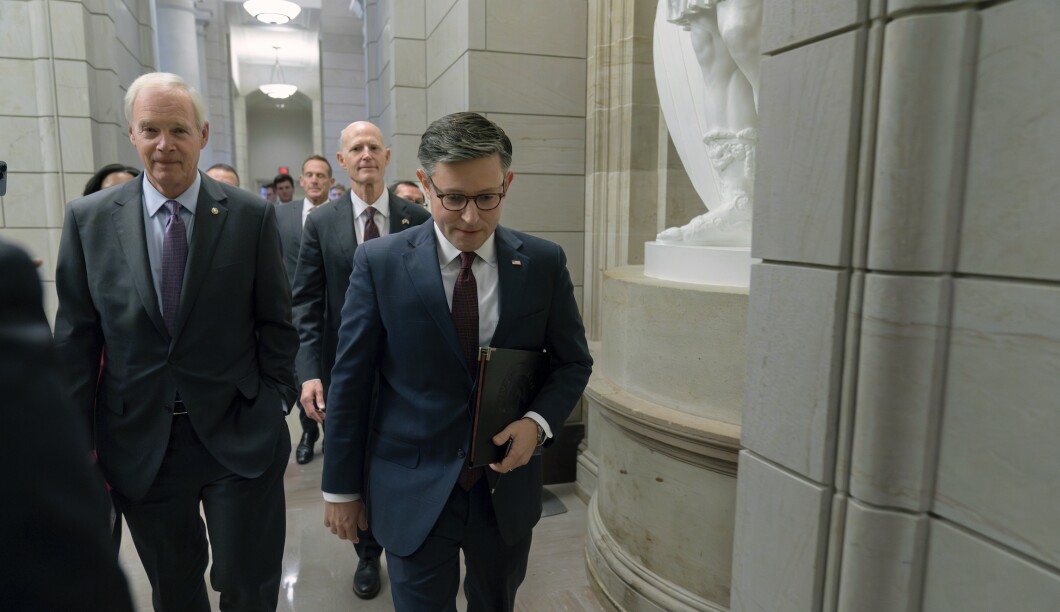
Senate conservatives are taking a more positive view of Speaker Mike Johnson’s (R-LA) stopgap funding bill, breaking with their counterparts in the House Freedom Caucus who opposed it.
Johnson’s “laddered” continuing resolution funds some agencies until Jan. 19 and the rest until Feb. 3 at current levels and doesn’t include policy riders on the border or Israel aid. The Freedom Caucus, which represents the hard-line conservatives of the House, took an official position against the proposal on Tuesday, denouncing it as a surrender to the Democrats.
HOUSE PASSES SPEAKER JOHNSON’S CONTINUING RESOLUTION IN FIRST STEP TO AVOID SHUTDOWN
The House ultimately passed the CR later that day, but the opposition of 93 Republicans meant Johnson had to rely on Democratic votes. The bill now heads to the Senate, where Majority Leader Chuck Schumer (D-NY) intends to take it up in its current form as soon as Wednesday.
One obstacle could be the Senate’s fiscal hawks, who are loathe to fund the government at current levels. But those members have so far shown little appetite for delaying the process ahead of a Friday shutdown deadline.
What’s more, most appear sympathetic to or outright supportive of Johnson’s approach.

Rep. Scott Perry (R-PA), the chairman of the Freedom Caucus, called the measure a continuation of the “status quo” that emboldens a “do-nothing Senate,” while Rep. Chip Roy (R-TX), its policy chairman, lamented there ought to be some concession to keep the government open at fiscal 2023 levels.
Yet Sen. Ron Johnson (R-WI), who hosted the speaker for a meeting with Senate Republicans earlier this month, praised the bill as an incremental win for conservatives in their efforts to rein in government spending.
Not only will the House avoid a Christmas omnibus for the first time in years, he said, due to the 2024 funding deadlines, but Democrats acquiesced to the two-step approach despite previously calling it “convoluted.”
“You know, I understand their concerns. I think Speaker Johnson understands their concerns. There’s just a difference of opinion on this one,” Ron Johnson said of the Freedom Caucus.
Sen. Rick Scott (R-FL), who holds regular dinners with House conservatives, was not as effusive in his support, lamenting that Israel aid did not make it into the legislation, but nonetheless spoke positively of the bill.
He, along with Ron Johnson, met with the speaker ahead of his meeting with Senate Republicans on Nov. 1.
“I think he’s got a tough job,” said Scott, who wants to review the bill text before deciding on his vote. “The positive is you’re not going to have a December omnibus.”
The common denominator between both chambers is conservatives see Mike Johnson as an ally. Rep. Kevin McCarthy (R-CA), booted from the speakership for advancing a similarly “clean” CR in September, had faced deep skepticism from hard-liners, who doubted his commitment to fiscal restraint.
For now, they don’t have the same mistrust of Mike Johnson, a former chairman of the conservative Republican Study Committee. In fact, his ascension to the speakership represented a major win for the conference’s right flank.
That has not stopped them from criticizing the speaker for taking the path of least resistance on the CR, however.
Ron Johnson called that criticism misguided. The real fight, he said, will be fiscal 2025 given the “mess” the speaker inherited. In addition to the House losing three weeks in the speaker’s race, five of the chamber’s 12 annual spending bills have stalled.
“To think you’re gonna balance the budget or get significant spending cuts in a two-month-long CR, it’s just not realistic,” he said. “It’s not an achievable goal, particularly when you’ve got so many big spenders in both parties.”
McCarthy did win budget cuts in the spring debt limit fight, in no small part because Senate Republicans threw their support behind the speaker. But House conservatives, disappointed with what amounted to a two-year spending freeze, forced him to pursue deeper cuts in the appropriations process under threat of being deposed.
Mike Johnson, drawing on the goodwill of his conference, has committed to continue that approach once a government shutdown is averted. But his success, imperiled by Democratic control of the White House and Senate, could very well depend on whether he can do better than McCarthy.
Sen. J.D. Vance (R-OH), a conservative populist in the Senate, expressed reservations about a CR but also sympathy for the speaker, who will need “a little bit of time to get the appropriations bills in order.”
“I think that he has every right to people’s trust on that account,” he said.
“The real question to me is not the CR,” said Vance, who is undecided on the bill. “The real question is whether the speaker uses this time to get the House appropriations process back on track. I think he has every intention to do it. I hope that he does, and if he does, I think he’ll earn a lot of trust from across the party.”
Senate Minority Whip John Thune (R-SD) expressed hope there will not be a great deal of “fanfare” once the Senate takes up the CR, which already has the blessing of Mitch McConnell (R-KY), the top Republican in the Senate.
In the past, Senate conservatives have delayed the process with their demand for amendment votes, but Thune predicted there will only be one or two. Sen. Rand Paul (R-KY), another fiscal hawk, has indicated he will request one.
By contrast, Mike Johnson, sensing that hard-liners would tank a procedural vote on the bill, was forced to consider it under a “suspension of the rules.” It easily cleared the two-thirds vote threshold required to skip that step.
CLICK HERE TO READ MORE FROM THE WASHINGTON EXAMINER
“It can always change. But we think there’s right now a high level of interest in moving the process along and getting the government funded before the deadline,” Thune said.
The Senate has only passed three of its spending bills, raising the prospect the chamber will need to consider a series of minibus bills to meet the new funding deadlines. Ron Johnson, despite his previous reluctance to lump the bills together, is open to that approach given the time constraints.





